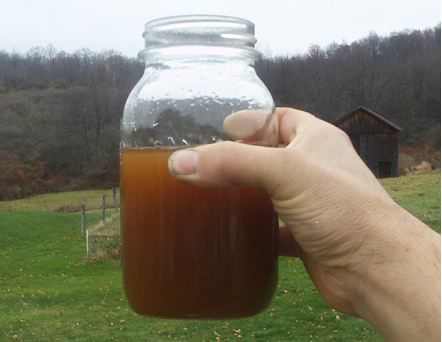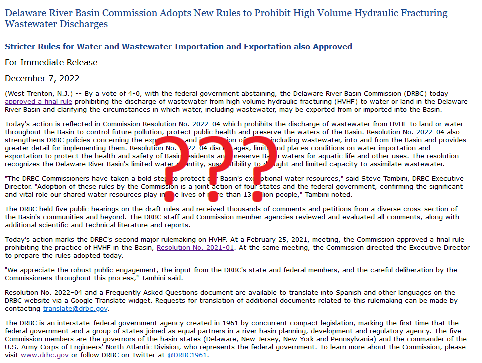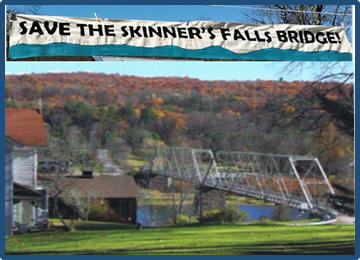
As Evidence Mounts, New Concerns About Fracking and Health
December 2, 2022
An Impending Mess: DRBC and the Media Spin the New Fracking Rules
December 12, 2022DRBC’s new rules governing fracking (see the press release) are disingenuous – they are not a positive step and will not protect the resources of the Delaware River Basin as the DRBC is mandated to do. These new regulations will result in the contamination of the Basin and harm the environment and human health.
If you go to Approved Final Rule and scroll down a little more than half way to: Final Rule: Activities Prohibited & Activities Not Regulated by the Final Rule, you will see the lists below.
Please see my comments after each item in red. Please bear in mind that I have not had a chance to carefully review all the details, but these comments reflect how I see these regulations now – a few hours after the December 7th DRBC meeting when they were revealed. We have lots of work ahead of us – THIS IS NOT A FULL BAN of either wastewater import or water export for fracking elsewhere – all of us living in or using Delaware River water – in the Delaware River Basin and out of the Basin (like NYC) are in danger of being poisoned.
B. Arrindell
Director, DCS
Examples of activities that are prohibited by the final rule:
- Discharge of HVHF wastewater to waters or land within the Basin; ‘Discharge’ was defined and prohibited to land or water in the previously released proposed regulations (October 2021) – so no change.
- Road spreading of HVHF wastewater; That this is prohibited is very good but, for more details, see the 5th item in the ’does not’ list below, which allows disposal of conventional drilling waste on roads.
- Injection of HVHF wastewater into deep wells within the Basin; Good that this is prohibited.
- Disposal of HVHF wastewater in Basin landfills; Good that this is prohibited, but what about cuttings? Cuttings from drilling are often put in landfills with about 1/3 sawdust drenched in wastewater. Hopefully a detail like this is in the revised regulations.
- Discharge of leachate from any landfill in the Basin that accepts HVHF waste after the effective date of the final regulations, including after treatment at an onsite or off-site leachate or wastewater treatment plant; Meaning that landfills CAN accept HVHF waste after these regulations go into effect and trucking them will have all the established hazards. Only the leachate from the landfills cannot be discharged, but what about leaks from the landfill, trucking spills, accidents, illegal dumping, etc.? Who is going to enforce these rules?
- Spills and leaks during transport, transfer or storage of HVHF wastewater within the Basin if not fully captured by a containment system in place throughout the duration of the spill or leak and thereafter promptly removed or remediated. When does a spill or leak happen IN a containment system and not in an unexpected place; much less be ‘fully captured by a containment system’? What does “promptly removed or remediated” mean? How can testing be done when the contents are secret because the oil and gas industry has exemptions allowing them to keep this information from the public. Plus illegal dumping in rural areas will happen. Why allow contamination of an area that is not contaminated? Who benefits from this? Low dose contamination will be rampant.
Examples of activities that are beyond the scope of the proposed and final rule follow. The final rule does not:
- Does not: Regulate air emissions from HVHF activities; Air emissions are just as dangerous as water contamination. Air impacts are rampant near drilling and oil gas infrastructure. Asthma, other respiratory damages, and chemical specific impacts occur.
- Does not: Categorically prohibit the transfer of HVHF wastewater into the Basin when no resulting discharge is proposed; Meaning wastewater CAN be brought into the Delaware River Basin. Who will ‘check up’ on these operations? PA has been very lax in its enforcement of drilling regulations.
- Does not: Regulate the transportation and storage of HVHF materials, which are regulated under detailed state and federal programs focused on these activities; Meaning wastewater CAN be brought into the Delaware River Basin for STORAGE. PA says there is a magical transformation of stored toxic wastes to become non-toxic after storage! Also what about illegal dumping? Who is watching?
- Does not: Categorically prohibit the transfer of water from the Basin if it would be used to support HVHF (or any other specified activity). However, the rule does limit the circumstances under which transfers of water from the Basin will be considered and provides for an evaluation of such proposals based on factors designed to ensure no harm to the Basin’s water resources or the health and safety of the Basin community; Meaning for example, a municipal water system at the boundary of the Delaware Basin can sell its drinking water and get Delaware River Basin water to replace it. So Delaware River Basin water can be used to support fracking elsewhere, to the detriment of the Basin, especially in times of low water or drought.
- Does not: Prohibit road spreading of wastewater from conventional drilling activities, an activity not within the scope of DRBC’s proposed rulemaking. The Commission will continue to coordinate with the Basin states to review the scientific evidence regarding harm to water resources caused by road spreading of conventional oil and gas production wastewater and may in the future consider whether additional regulation of the practice is needed in the Basin. Meaning that all a company has to say is that the waste they are spreading (dumping on roads) is from a conventional well and they will get no push back from DRBC. Whatever goes on roads winds up in either the water or the air. According to the Federal Energy Information Agency, over 90% of new wells are fracked, whether ‘officially’ conventional or unconventional (fracked), so the same chemicals are in use and likely the same materials are released from the formation layers. PLUS who decides what is conventional or unconventional? Bear in mind that in PA conventional or unconventional is related to the target layers drilled, not the pressure or volume of water used, or if horizontal drilling is used. Those doing the disposing on roads are required to submit an analysis of a ’typical’ load only once a year – not what is in each specific load!




